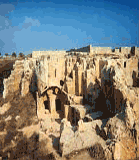 |
|
CYPRUS HISTORY 10000 YEARS OF CIVILIZATION
Cyprus, though an island in comparison to the surrounding countries, was destined to play a very important role in the history of man- kind. This was bound to be so since the island is located in the centre of the ancient world which is known as the cradle of western civilization.
Asia Minor is only 40 miles away and the Syrian coast only 60 from the easternmost tip of the Karpass peninsula. Egypt and the Aegean Sea are 240 miles apart. Therefore it was only natural that a great civilization flowered in Cyprus beginning as early as the 8th millennium BC, when stone was the only material used either for weapons or utensils.
The discovery of copper which occurred in the 3rd millennium marked the turning point in the history of the island which gradually turned it into a bone of contention among the more powerful neighbors. Hittites in Asia Minor and Egyptians in the south claimed the island as their possession, but the Greeks from the west were those who stamped its destiny when in the late 13th, 12th and 11th centuries BC, they established themselves as permanent settlers. Despite the fact that the island fell prey to all big powers of the day, the presence of Greeks gave Cyprus a historical and cultural continuity ever since.
The beautiful island of Cyprus with its 10,000 years of history is in the extreme eastern part of the Mediterranean Sea and standing as it does at the crossroads of three continents Europe, Asia and Africa it has had a tumultuous history. Cyprus is the third largest island in the Mediterranean with an area of 3,572 sq. miles. It has a maximum length of 150 miles from east to west and a maximum width of 60 miles from north to south. Renowned for its healthy and pleasant climate Cyprus enjoys dry summers and mild winters.
The sun is shining for more than 300 days per year. Minimum temperatures in the winter are 6°C to 13°C and warmest temperatures in the summer vary between 25°C to occasionally 40°C. Over two and a half million visitors choose Cyprus every year. It is a general consensus that the natural beauties of the island, its unspoiled environment and archaeological wealth and the traditional hospitality of its people make Cyprus an ideal place for holidays, relaxation and retirement.
Cyprus is a Republic with a Presidential system of government. Cyprus is a member of the United Nations, the Council of Europe, the Commonwealth and the Non-Aligned Movement. According to the above treaty, Britain retains two Sovereign Bases (158, 5 sq. km) on the island, at Dhekelia and Akrotiri-Episkopi. The Independent and Sovereign Republic of Cyprus is a member of the United Nations Organization, the Council of Europe, the Commonwealth and is now a Full Member of the European Union. For the very long time Cyprus has kept friendly relations with Eastern European and Mediterranean countries. The currency used in Cyprus is the Euro.
AIRPORTS LARNAKA INTERNATIONAL AIRPORT INTERNATIONAL AIRPORT PAPHOS
Visitors arriving in Cyprus by air may enter the Republic only through the International airports of Larnaka and Pafos. All airports in the part of the Republic illegally occupied by the Turkish invasion forces, have been declared by the Government of Cyprus as prohibited ports of entry and exit, and no visitor should enter or leave the Republic through these ports.
Paphos - The birthplace of Aphrodite and in Roman times, the capital of Cyprus. Paphos is rapidly becoming the most popular holiday destination in Cyprus. Its small picturesque harbour and fort, built by Turks in 1592 on the site of a medieval castle, is lined with restaurants serving fresh fish and is loved by both tourists and residents alike. Nearby, are the well preserved archaeological sites of the House of Theseus, St. Pauls Pillar and the House of Dionysis entitling Paphos to be included on UNESCO's ' World Cultural Heritage List'.
Climate The islands Mediterranean climate is marked by mild winters and hot, dry summers. The average daytime temperature in winter is around 10-13°C and 26-29° in summer. Considered to have one of the most agreeable climates in the region, Cyprus enjoys about 300 sunny days a year. During the six months of summer, the sun shines for an average of 11,5 hours a day, and for around 5,5 hours during the cloudiest months of December and January. While snow is very rare on the central plain and coast, snowfall occurs every year between December and April in areas with an altitude exceeding 1 000 m. The higher slopes of the Troodos mountain range provide good skiing conditions for about 6 weeks a year. |
|
|





